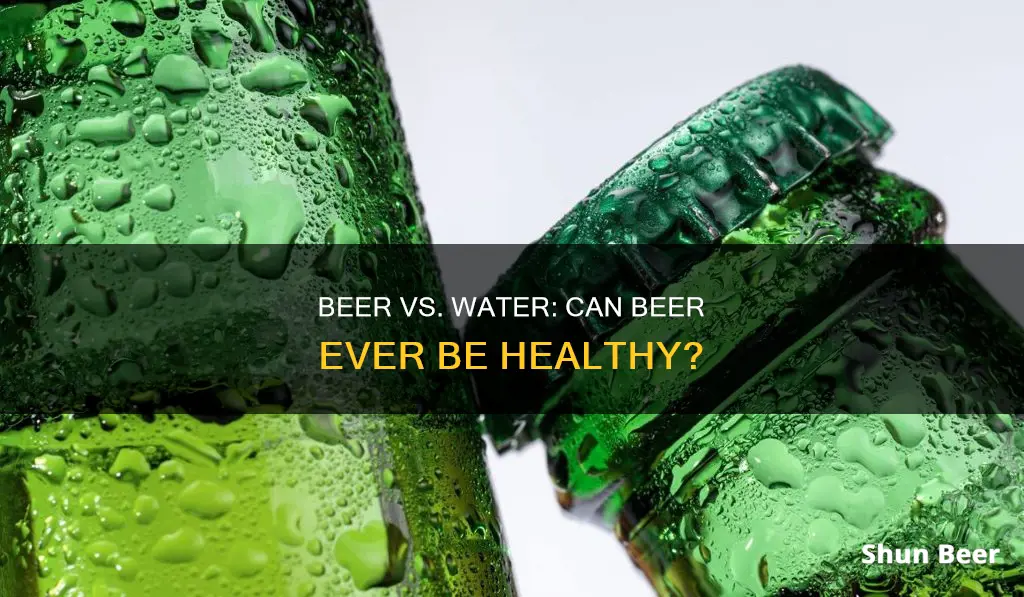
Beer has been a popular drink throughout history, with some records indicating that it was consumed more than water during certain periods. However, the idea that people primarily drank beer instead of water during the Middle Ages is a misconception. While water during this time was often polluted and full of bacteria, access to clean water was still possible, and it was commonly consumed. So, can beer be a substitute for water? While beer contains water, the diuretic effect of alcohol can lead to dehydration, making it a net negative for hydration in most cases.
| Characteristics | Values |
|---|---|
| Can beer be a substitute for water? | No, beer cannot be a substitute for water. |
| Why? | The alcohol in beer has a diuretic effect, which can lead to dehydration. |
| Are there any benefits of drinking beer? | Yes, some studies suggest that beer can be a good way to rehydrate after exercise. |
| What about in the Middle Ages? | While beer was commonly consumed in the Middle Ages, water was also plentiful and widely consumed. |
What You'll Learn

Beer is not a suitable replacement for water due to its diuretic effect
It is important to understand that beer is not a suitable replacement for water, and this is mainly due to its diuretic effect. While beer contains water, the alcohol it contains also has a diuretic effect, which means that it increases the production of urine. This can lead to dehydration, as the body loses more water than it takes in.
The diuretic effect of alcohol is well-known, and it is one of the reasons why drinking too much alcohol can lead to dehydration and other related issues, such as headaches and fatigue. In fact, the diuretic effect of alcohol is so significant that even moderate consumption can impact the body's fluid balance. This effect is particularly noticeable with beverages that have higher alcohol concentrations, such as beer, which typically contains around 4-5% alcohol.
Research has shown that the diuretic effect of alcohol can delay the recovery of fluid balance after exercise-induced dehydration. A study by Shirreffs and Maughan (1996) found that while rehydration with water restored fluid balance effectively, beverages with 4% alcohol tended to delay the recovery process. This delay in recovery is due to the diuretic effect of alcohol, which causes the body to excrete more water than it retains.
Furthermore, the diuretic effect of alcohol can also impact the absorption of nutrients and electrolytes. Alcohol can interfere with the body's ability to absorb water and essential electrolytes, such as sodium and potassium, which are crucial for maintaining fluid balance and proper bodily functions. This interference can further exacerbate the dehydrating effects of alcohol and impact overall health and performance.
In conclusion, while beer may provide some hydration due to its water content, the diuretic effect of the alcohol it contains makes it an unsuitable replacement for water. The diuretic effect can lead to dehydration, disrupt fluid balance, and interfere with nutrient and electrolyte absorption. Therefore, it is important to prioritize water intake and maintain a healthy fluid balance, especially when engaging in physical activities or consuming alcoholic beverages.
Beer and Surgery: What's the Safe Wait Time?
You may want to see also

Drinking only beer will lead to dehydration and death within days or weeks
Drinking only beer and no water will likely lead to dehydration and death within days or weeks. While beer contains plenty of water, the diuretic effect of alcohol means that it does not hydrate the body. The time taken to die from dehydration would depend on the strength and volume of beer consumed.
In addition to dehydration, a person consuming only beer would also be at risk of vitamin and protein deficiencies. Vitamin C deficiency, or scurvy, would be an ironic outcome, as beer was once considered a prophylactic against this disease. In the 1920s, two monkeys fed a diet of India pale ale and other foods lacking in vitamin C exhibited symptoms of scurvy within two months.
Other vitamin deficiencies could also occur, including folate and vitamin A deficiencies, leading to anemia and night blindness, respectively. Protein deficiency could also cause muscle wasting and anemia.
Finally, the first thing likely to kill a person consuming only beer is delirium tremens (DTs), a potentially fatal illness that occurs after abruptly stopping high alcohol intake. Therefore, it is important to seek medical help when attempting to stop drinking, as alcohol withdrawal can be dangerous and even fatal.
Booze and Workouts: Beer vs. Bourbon's Impact
You may want to see also

Drinking water is recommended by health professionals
While some studies suggest that beer can be a suitable replacement for water, health professionals still recommend drinking water.
Water is crucial for many bodily functions. Firstly, it lubricates the joints, helping to lessen discomfort caused by conditions like arthritis. Secondly, it forms saliva and mucus, aiding digestion and keeping the mouth, nose, and eyes moist. Thirdly, it delivers oxygen throughout the body. Water is also essential for skin health, as dehydration can make the skin more vulnerable to disorders.
Drinking water is important for regulating body temperature. When the body heats up, water stored in the middle layers of the skin comes to the surface as sweat, cooling the body as it evaporates. Dehydration can cause the body temperature to rise, leading to conditions like hyperthermia. Water also helps to maximize physical performance, as dehydration can negatively impact strength, power, and endurance.
Water is necessary for proper cognitive function, as not drinking enough can negatively affect focus, alertness, and short-term memory. It also helps improve mood, as dehydration may result in fatigue, confusion, and anxiety.
Drinking water is recommended to prevent constipation, as it aids in digestion and helps with nutrient absorption. It also helps to flush out waste from the body through perspiration, urination, and defecation.
Water is important for maintaining kidney health and preventing kidney stones. It also helps to maintain blood pressure, as dehydration can cause blood to become thicker, leading to decreased blood pressure.
While the amount of water needed each day varies depending on factors such as age, sex, and activity levels, the Academy of Nutrition and Dietetics recommends an average daily intake of 11.5 cups for women and 15.5 cups for men.
Drinking Beer While Driving: Is It Legal?
You may want to see also

Water was plentiful and common in the Middle Ages
Drinking beer instead of water can lead to dehydration and even death, depending on the strength and volume of beer consumed. While beer contains plenty of water, the alcohol it contains is a diuretic, which means that it increases urine production and can lead to a net fluid loss.
Medical texts and health manuals from the Middle Ages often emphasised the benefits of drinking water, as long as it came from good sources. For example, Paul of Aegina, a 7th-century Byzantine physician, wrote, "of all things, water is of most use in every mode of regimen... [t]he best water is devoid of quality as regards taste and smell, is most pleasant to drink, and pure to the sight; and when it passes through the praecordia quickly, one cannot find a better drink."
Medieval religious texts also mention drinking water, with some hagiographic accounts describing how saints abstained from alcoholic beverages and drank water instead. Additionally, some monastic communities advocated relying solely on water.
While beer was consumed in the Middle Ages, it was not a replacement for water. Beer during this period was much lighter and less refined than modern beer, and it was often made at home using barley or dredge (barley and oats). It was seen more as a nutritional supplement than an alternative to water, providing much-needed calories for those working in the fields.
In conclusion, while beer can provide some hydration, it is not a suitable substitute for water as excessive consumption can lead to dehydration and health issues. Water, on the other hand, was readily available and commonly consumed in the Middle Ages, despite the common misconception that people during this period only drank wine, ale, or other beverages.
Beer Caramelizer: How Does It Work and Why?
You may want to see also

Beer was viewed as a nutritious alternative to water
In the Middle Ages, beer was viewed as a nutritious alternative to water. Water during this period was often polluted and full of bacteria, which made it unfit for drinking. Beer, on the other hand, was weakly brewed from barley and provided calories and energy. It was especially beneficial for workers and farmers who needed to stay hydrated and energised throughout the day.
However, beer was not the primary drink of choice for everyone during this time. Medieval people had access to clean water sources, such as wells and fresh streams, and in larger towns, there were even infrastructures to supply water to citizens. They were not dependent solely on beer as a substitute for water. Records from medieval times indicate that water was plentiful and commonly consumed. For example, Saint Gregory of Tours, a Gallo-Roman historian, mentions a boy who was so religious that he primarily drank water, like many other devout individuals during that period.
The perception of beer as a nutritious alternative to water is further supported by its use as a form of payment. In the Middle Ages, beer was commonly used to pay taxes and tithes. This reflects its value and importance in society. Beer was also considered more expensive than water since it had to be purchased, and taxes and transportation fees were often involved.
While beer provided hydration and nutritional benefits, it is important to note that consuming only beer and no water could lead to health issues. The alcohol in beer has a diuretic effect, which can cause dehydration if not balanced with adequate water intake. Additionally, a strict beer diet could lead to vitamin C and protein deficiencies, as evidenced by experiments conducted on monkeys in the 1920s.
In conclusion, while beer was viewed as a nutritious alternative to water in the Middle Ages, it was not the only source of hydration. Medieval people had access to clean water and consumed it regularly. Beer provided additional benefits, such as calories and energy, but it was also more costly than water. Consuming beer exclusively without water could lead to health complications.
Beer and Pfizer: Safe Drinking After the Vaccine
You may want to see also
Frequently asked questions
No, you should not substitute beer for water. While beer is mostly water, the diuretic effect of alcohol means it is not a suitable replacement and can lead to dehydration.
No, beer is not better for rehydration. While some studies have suggested that beer may be slightly better for rehydration after exercise, others have found no difference between beer and water.
No, despite the common belief that beer was consumed due to polluted water, there is evidence that water was plentiful and common.
Yes, for healthy people, drinking water is enough to stay hydrated. The "8 x 8" guideline, which recommends drinking 8 glasses of water per day, is not supported by scientific evidence.
Beer may have been seen as a more nutritious alternative to water in the past, providing calories and energy. However, it is also more costly and can contribute to health issues such as scurvy and protein deficiency if consumed exclusively.







